Related Research Articles
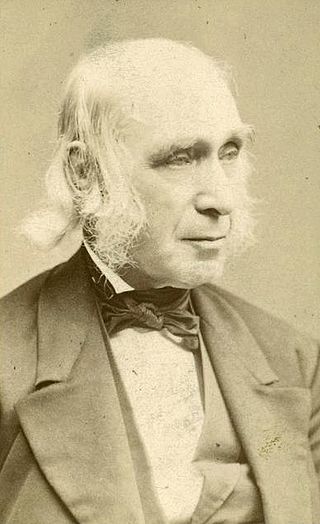
Amos Bronson Alcott was an American teacher, writer, philosopher, and reformer. As an educator, Alcott pioneered new ways of interacting with young students, focusing on a conversational style, and avoided traditional punishment. He hoped to perfect the human spirit and, to that end, advocated a plant-based diet. He was also an abolitionist and an advocate for women's rights.

Louisa May Alcott was an American novelist, short story writer, and poet best known for writing the novel Little Women (1868) and its sequels Good Wives (1869), Little Men (1871) and Jo's Boys (1886). Raised in New England by her transcendentalist parents, Abigail May and Amos Bronson Alcott, she grew up among many well-known intellectuals of the day, including Margaret Fuller, Ralph Waldo Emerson, Nathaniel Hawthorne, Henry David Thoreau, and Henry Wadsworth Longfellow.

Ralph Waldo Emerson, who went by his middle name Waldo, was an American essayist, lecturer, philosopher, abolitionist, and poet who led the Transcendentalist movement of the mid-19th century. He was seen as a champion of individualism and critical thinking, as well as a prescient critic of the countervailing pressures of society and conformity. Friedrich Nietzsche thought he was "the most gifted of the Americans", and Walt Whitman called him his "master".
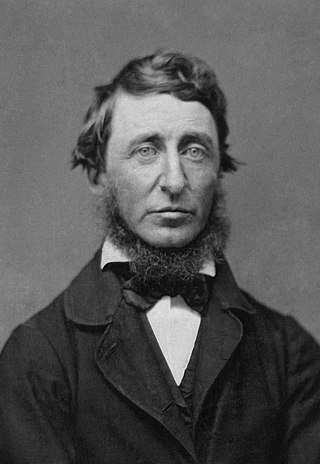
Henry David Thoreau was an American naturalist, essayist, poet, and philosopher. A leading transcendentalist, he is best known for his book Walden, a reflection upon simple living in natural surroundings, and his essay "Civil Disobedience", an argument in favor of citizen disobedience against an unjust state.

Concord is a town in Middlesex County, Massachusetts, United States. In the 2020 census, the town population was 18,491. The United States Census Bureau considers Concord part of Greater Boston. The town center is near where the Sudbury and Assabet rivers join to form the Concord River.

Sleepy Hollow Cemetery is a rural cemetery located on Bedford Street near the center of Concord, Massachusetts. The cemetery is the burial site of a number of famous Concordians, including some of the United States' greatest authors and thinkers, especially on a hill known as "Author's Ridge."

The Old Manse is a historic manse in Concord, Massachusetts, United States, notable for its literary associations. It is open to the public as a nonprofit museum owned and operated by the Trustees of Reservations. The house is located on Monument Street, with the Concord River just behind it. The property neighbors the North Bridge, a part of Minute Man National Historical Park.

The Wayside is a historic house in Concord, Massachusetts. The earliest part of the home may date to 1717. Later it successively became the home of the young Louisa May Alcott and her family, who named it Hillside, author Nathaniel Hawthorne and his family, and children's writer Margaret Sidney. It became the first site with literary associations acquired by the National Park Service and is now open to the public as part of Minute Man National Historical Park.

March (2005) is a novel by Geraldine Brooks. It is a novel that retells Louisa May Alcott's novel Little Women from the point of view of Alcott's protagonists' absent father. Brooks has inserted the novel into the classic tale, revealing the events surrounding March's absence during the American Civil War in 1862. The novel won the 2006 Pulitzer Prize for Fiction.
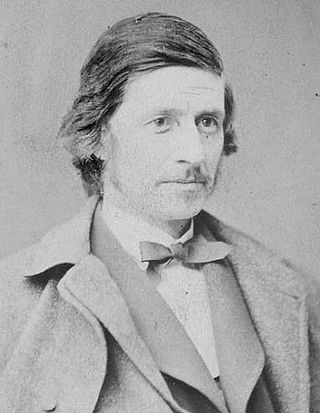
Franklin Benjamin Sanborn was an American journalist, teacher, author, reformer, and abolitionist. Sanborn was a social scientist and memorialist of American transcendentalism who wrote early biographies of many of the movement's key figures. He founded the American Social Science Association in 1865 "to treat wisely the great social problems of the day." He was a member of the so-called Secret Six, or "Committee of Six", which funded or helped obtain funding for John Brown's Raid on Harpers Ferry; in fact, he introduced Brown to the others. A recent scholar describes him as "humorless."

The Ralph Waldo Emerson House is a house museum located at 18 Cambridge Turnpike, Concord, Massachusetts, and a National Historic Landmark for its associations with American philosopher Ralph Waldo Emerson. He and his family named the home Bush. The museum is open mid-April to mid-October; an admission fee is charged.
Anna Bronson Alcott Pratt was the elder sister of American novelist Louisa May Alcott. She was the basis for the character Margaret "Meg" of Little Women (1868), her sister's classic, semi-autobiographical novel.

The Thoreau–Alcott House is a historic house at 255 Main Street in Concord, Massachusetts, United States that was home to the writers Henry David Thoreau and Louisa May Alcott at different times.
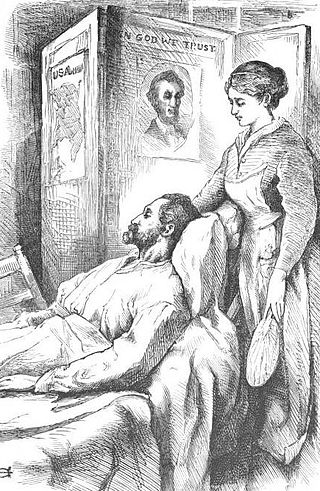
Hospital Sketches (1863) is a compilation of four sketches based on letters Louisa May Alcott sent home during the six weeks she spent as a volunteer nurse for the Union Army during the American Civil War in Georgetown.

Mary Colman Wheeler was the founder and first head of the Wheeler School in Providence, Rhode Island.
A Yankee in Canada, with Anti-Slavery and Reform Papers is an anthology of works by Henry David Thoreau, edited by his sister Sophia Thoreau and his friends William Ellery Channing and Ralph Waldo Emerson. It was published in 1866, after Thoreau’s death, by Ticknor and Fields, the Boston firm that had published Walden.
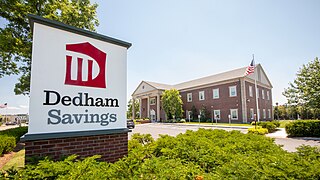
Dedham Savings is one of the oldest American banks still in operation and one of the oldest banks in the state of Massachusetts still doing business under its original charter.
Minot Pratt (1805-1878) was a founder, a director and head farmer of the Brook Farm experimental community, a printer, a friend of noted Concord, Massachusetts, writers, Henry David Thoreau, Amos Bronson Alcott, Louisa May Alcott, Ralph Waldo Emerson, and Nathaniel Hawthorne, and a naturalist in Concord, Massachusetts. At his death in 1878 it was written of him: “his recreation, and one might say, his worship, was among the wild-flowers and woodlands, which he knew almost as familiarly as Thoreau did. Thoreau was a ‘poet-naturalist,’ Minot Pratt was a farmer-naturalist, -- but in both the love of nature was far stronger than the mere scientific thirst for knowledge. They revered nature and treated her with the modesty due to a maiden, and with the respect of a young lover. This sentiment did not wither as age came on.”
The Concord Female Anti-Slavery Society was a female abolitionist organisation in Concord, Massachusetts, in the mid 19th century. This society was a significant influence on Henry David Thoreau, Ralph Waldo Emerson, and Louisa May Alcott.
James Richardson was a lawyer, a business and civic leader, and a member of the Massachusetts Senate from Dedham, Massachusetts.
References
- 1 2 3 4 5 6 7 8 9 Parr 2009, p. 73.
- 1 2 ""Sophia Ford: The Great Love Henry David Thoreau Didn't Want"". New England Historical Society . Retrieved June 4, 2020.
- 1 2 Parr 2009, p. 74.
- ↑ "SOPHIA FOORD — ABOLITIONIST AND TEACHER". Duke University Libraries. Retrieved July 29, 2023.